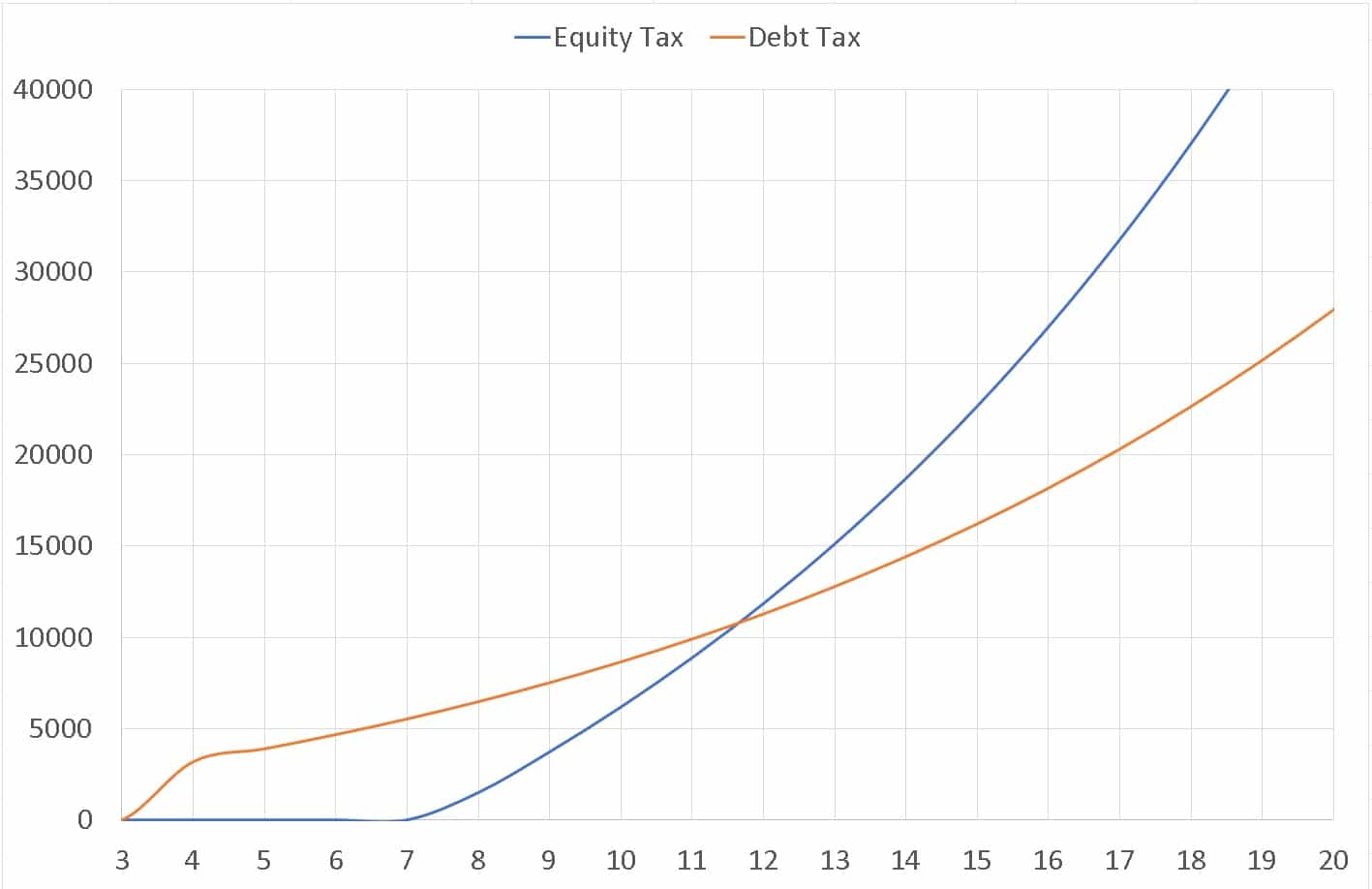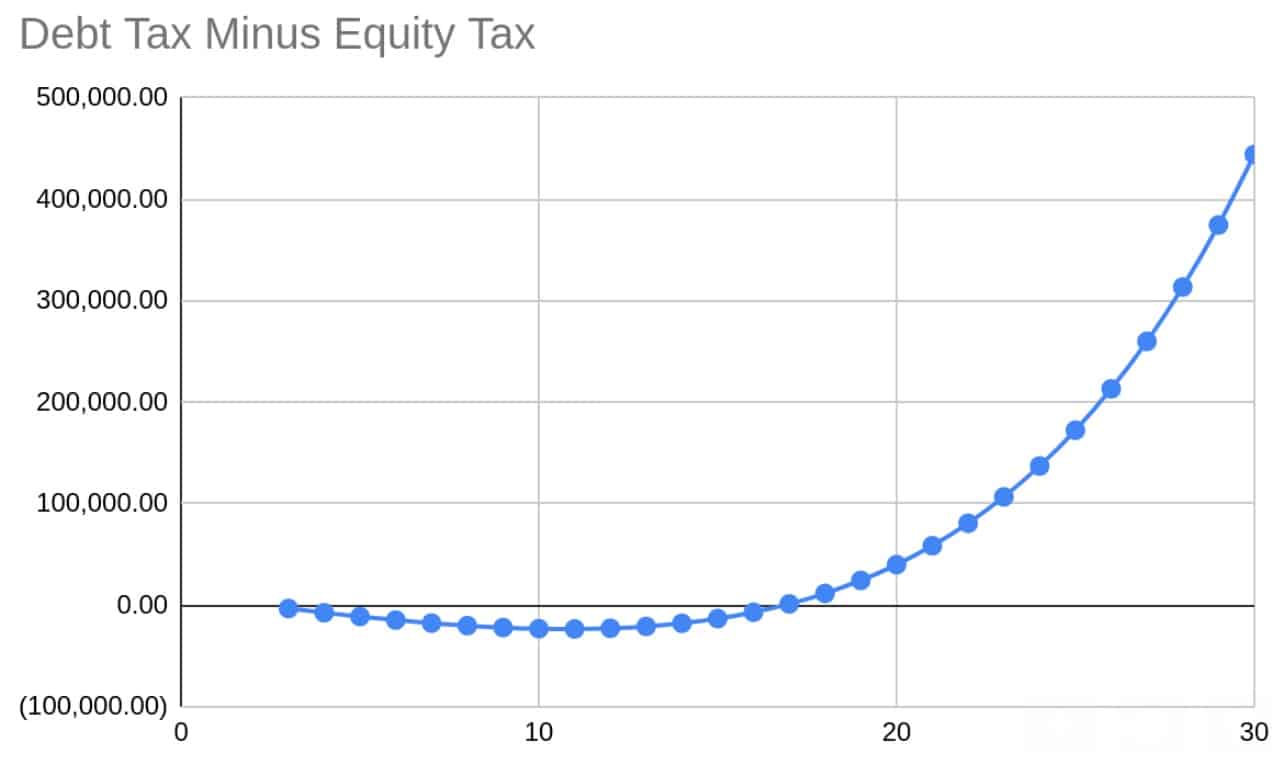Last Updated on January 29, 2023 at 3:28 pm
From April 1st 2018, long term capital gains on stocks and equity mutual funds over Rs. one lakh have been taxed at the rate of 10% (plus 4% education cess) without indexation benefits.
P V Subramanyam of subramoney recently pointed out to me that we will be paying more tax on equity mutual fund gains in a few years than debt (or non-equity MF) gains. He suggested that I compute this scenario to know when this would happen. Long-term readers may know that I have often made calculators suggested by Subra, culminating in our book, You can be rich too with goal-based investing. The calculators part of this book is now available on SEBI’s investor education website.
Subra’s logic is as follows. The tax rate on equity mutual funds is a flat 10%. Soon the Rs. one lakh tax-free limit would be breached, and the tax will kick in. Non-equity mutual funds (any fund that does not invest in 65% or more of Indian stocks or Indian ETFs) benefit from indexation.
That is, the capital gain will not be computed as the sale price minus the purchase price (as is the case for equity funds). It is computed as the sale price minus the indexed purchase price.
Join 32,000+ readers and get free money management solutions delivered to your inbox! Subscribe to get posts via email! (Link takes you to our email sign-up form)
🔥Want to create a complete financial plan? Learn goal-based investing? Exclusive access to our DIY tools? Increase your income with your skills? Enjoy massive discounts on our robo-advisory tool & courses! 🔥
That is, we inflate the purchase price using the cost inflation indexation to the year of sale. In other words, we ask if we had purchased those non-equity funds units today (when we are going to sell), how much would the purchase price increase due to inflation? A detailed example is here: Taxation of international mutual funds explained with an example.
Subra argues that indexation-benefit can be immense over time. Even though the tax rate of non-equity funds is 20% (plus a 4% education cess), the tax is applied to the indexed capital gain. Therefore the effective tax rate reduces well below 20%.
If we assume equity outperforms debt over the long term, the tax on equity can be higher than on non-equity funds.
Consider an Rs. 1 lakh purchase in equity and non-equity funds simultaneously. Assume that the equity return is 10% and the non-equity fund return is 7% (we shall assume it is a debt fund). We also assume that the cost inflation increases yearly at an average rate of about 5%.
For these assumptions, after 12 years, the tax on equity is higher than the tax on the debt fund, as shown below. The chart starts from three years as we compare equity LTCG taxation with non-equity LTCG taxation.

This is why Subra argues that we need indexation benefits for equity as well. The Rs. one lakh tax-free limit will not matter much if our gains are much higher. Over time the tax on this will increase compared to the non-equity LTCG tax, which comes with indexation benefits. Let us hope the government introduces indexation benefits for equity LTCG as well.
The calculator used to create the above graph is part of the freefincal investor circle. You can join the investor circle to get lifetime access to several unique tools, discussion forums, and bug fixes.
Author M T Raghunath prefers a different explanation. Readers may recall his investment book for newbies, Primer on Money and Investing: Fundamental concepts and first-principles-based understanding of money and investing.
Consider the following. An investment of Rs. 15 Lakhs in a debt MF versus an investment of 15 Lakhs in an equity MF. Assume that the returns are the same = 9% and inflation is 6%. In that case, the amount of money at the end of the period before taxes is the same regardless of which fund I had chosen.
Equity would have had higher volatility and is riskier, but here we are assuming that we got the same returns pre-tax because of the volatility or market performance. Now because of the indexation benefit, we end up paying less taxes on the debt returns compared to equity even though the debt rates are higher, and we have a 1L waiver on equity gains. This is illustrated below.

If the investment term is less than 16 years, we will pay more tax on the equity fund than the debt fund. We need that much time for the differential in the compound growth graphs to demonstrate the difference between the 10% and 20% post-indexation tax rates.
🔥Enjoy massive discounts on our courses, robo-advisory tool and exclusive investor circle! 🔥& join our community of 7000+ users!
Use our Robo-advisory Tool for a start-to-finish financial plan! ⇐ More than 2,500 investors and advisors use this!
Track your mutual funds and stock investments with this Google Sheet!
We also publish monthly equity mutual funds, debt and hybrid mutual funds, index funds and ETF screeners and momentum, low-volatility stock screeners.





- Do you have a comment about the above article? Reach out to us on Twitter: @freefincal or @pattufreefincal
- Have a question? Subscribe to our newsletter using the form below.
- Hit 'reply' to any email from us! We do not offer personalized investment advice. We can write a detailed article without mentioning your name if you have a generic question.
Join 32,000+ readers and get free money management solutions delivered to your inbox! Subscribe to get posts via email! (Link takes you to our email sign-up form)
About The Author
 Dr M. Pattabiraman(PhD) is the founder, managing editor and primary author of freefincal. He is an associate professor at the Indian Institute of Technology, Madras. He has over ten years of experience publishing news analysis, research and financial product development. Connect with him via Twitter(X), Linkedin, or YouTube. Pattabiraman has co-authored three print books: (1) You can be rich too with goal-based investing (CNBC TV18) for DIY investors. (2) Gamechanger for young earners. (3) Chinchu Gets a Superpower! for kids. He has also written seven other free e-books on various money management topics. He is a patron and co-founder of “Fee-only India,” an organisation promoting unbiased, commission-free investment advice.
Dr M. Pattabiraman(PhD) is the founder, managing editor and primary author of freefincal. He is an associate professor at the Indian Institute of Technology, Madras. He has over ten years of experience publishing news analysis, research and financial product development. Connect with him via Twitter(X), Linkedin, or YouTube. Pattabiraman has co-authored three print books: (1) You can be rich too with goal-based investing (CNBC TV18) for DIY investors. (2) Gamechanger for young earners. (3) Chinchu Gets a Superpower! for kids. He has also written seven other free e-books on various money management topics. He is a patron and co-founder of “Fee-only India,” an organisation promoting unbiased, commission-free investment advice.Our flagship course! Learn to manage your portfolio like a pro to achieve your goals regardless of market conditions! ⇐ More than 3,000 investors and advisors are part of our exclusive community! Get clarity on how to plan for your goals and achieve the necessary corpus no matter the market condition is!! Watch the first lecture for free! One-time payment! No recurring fees! Life-long access to videos! Reduce fear, uncertainty and doubt while investing! Learn how to plan for your goals before and after retirement with confidence.
Our new course! Increase your income by getting people to pay for your skills! ⇐ More than 700 salaried employees, entrepreneurs and financial advisors are part of our exclusive community! Learn how to get people to pay for your skills! Whether you are a professional or small business owner who wants more clients via online visibility or a salaried person wanting a side income or passive income, we will show you how to achieve this by showcasing your skills and building a community that trusts and pays you! (watch 1st lecture for free). One-time payment! No recurring fees! Life-long access to videos!
Our new book for kids: “Chinchu Gets a Superpower!” is now available!


Must-read book even for adults! This is something that every parent should teach their kids right from their young age. The importance of money management and decision making based on their wants and needs. Very nicely written in simple terms. - Arun.Buy the book: Chinchu gets a superpower for your child!
How to profit from content writing: Our new ebook is for those interested in getting side income via content writing. It is available at a 50% discount for Rs. 500 only!
Do you want to check if the market is overvalued or undervalued? Use our market valuation tool (it will work with any index!), or get the Tactical Buy/Sell timing tool!
We publish monthly mutual fund screeners and momentum, low-volatility stock screeners.
About freefincal & its content policy. Freefincal is a News Media Organization dedicated to providing original analysis, reports, reviews and insights on mutual funds, stocks, investing, retirement and personal finance developments. We do so without conflict of interest and bias. Follow us on Google News. Freefincal serves more than three million readers a year (5 million page views) with articles based only on factual information and detailed analysis by its authors. All statements made will be verified with credible and knowledgeable sources before publication. Freefincal does not publish paid articles, promotions, PR, satire or opinions without data. All opinions will be inferences backed by verifiable, reproducible evidence/data. Contact information: To get in touch, use this contact form. (Sponsored posts or paid collaborations will not be entertained.)
Connect with us on social media
- Twitter @freefincal
- Subscribe to our YouTube Videos
- Posts feed via Feedburner.
Our publications
You Can Be Rich Too with Goal-Based Investing
 Published by CNBC TV18, this book is meant to help you ask the right questions and seek the correct answers, and since it comes with nine online calculators, you can also create custom solutions for your lifestyle! Get it now.
Published by CNBC TV18, this book is meant to help you ask the right questions and seek the correct answers, and since it comes with nine online calculators, you can also create custom solutions for your lifestyle! Get it now.Gamechanger: Forget Startups, Join Corporate & Still Live the Rich Life You Want
 This book is meant for young earners to get their basics right from day one! It will also help you travel to exotic places at a low cost! Get it or gift it to a young earner.
This book is meant for young earners to get their basics right from day one! It will also help you travel to exotic places at a low cost! Get it or gift it to a young earner.Your Ultimate Guide to Travel
 This is an in-depth dive into vacation planning, finding cheap flights, budget accommodation, what to do when travelling, and how travelling slowly is better financially and psychologically, with links to the web pages and hand-holding at every step. Get the pdf for Rs 300 (instant download)
This is an in-depth dive into vacation planning, finding cheap flights, budget accommodation, what to do when travelling, and how travelling slowly is better financially and psychologically, with links to the web pages and hand-holding at every step. Get the pdf for Rs 300 (instant download)